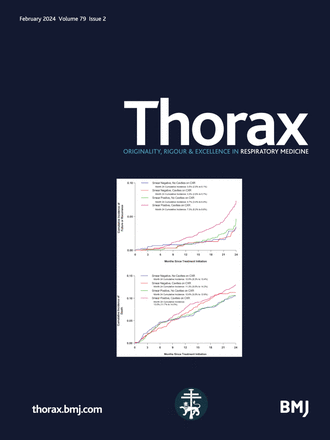Journal club
IF 7.7
1区 医学
Q1 RESPIRATORY SYSTEM
引用次数: 0
Abstract
Metastatic malignant pleural effusion (MMPE) is associated with highly variable survival, highlighting the need for accurate prognostic tools to guide clinical decision-making. The LENT score has traditionally been used to estimate median survival, whereas the PROMISE score was developed to predict 3 month mortality. A recent external validation of both models (ERJ Open Res 2025, DOI: 10.1183/23120541.01019–2024) in 773 patients revealed limitations. Although both scores demonstrated moderate discriminative ability for overall survival (Harrell’s C-statistics 0.72 for LENT, 0.73 for PROMISE), their median survival estimates lacked precision. Performance improved at fixed timepoints (3-, 6-, and 12 months mortality), with C-indices approaching 0.8. However, both scores underestimated survival in low-risk patients and lacked integration of tumor-specific features or oncogenic drivers such as EGFR mutations. Additionally, LENT includes mesothelioma and unconfirmed effusions, which may inflate survival estimates, while PROMISE requires biomarkers not always available in routine practice. To overcome these limitations, the GASENT model was recently developed prospectively in Galicia (Arch Bronconuemol 2025, DOI: 10.1016/j.arbres.2025.04.001) using a derivation cohort (n=475) and validated in an independent cohort (n=205). It incorporates six widely available variables: Age, Sex, ECOG-Performance Status, Neutrophil-to-Lymphocyte Ratio, and Tumour type. GASENT …杂志俱乐部
转移性恶性胸腔积液(MMPE)与高度可变的生存率相关,强调需要准确的预后工具来指导临床决策。传统上,LENT评分用于估计中位生存期,而PROMISE评分用于预测3个月死亡率。最近在773名患者中对这两种模型(ERJ Open Res 2025, DOI: 10.1183/23120541.01019-2024)进行的外部验证显示出局限性。尽管两种评分都显示出对总生存期的中等判别能力(Harrell的c -统计数据显示,LENT为0.72,PROMISE为0.73),但它们的中位生存期估计缺乏准确性。在固定时间点(3个月、6个月和12个月死亡率),性能得到改善,c指数接近0.8。然而,这两种评分都低估了低风险患者的生存率,并且缺乏肿瘤特异性特征或致癌驱动因素(如EGFR突变)的整合。此外,LENT包括间皮瘤和未经证实的积液,这可能会提高生存估计,而PROMISE需要的生物标志物在常规实践中并不总是可用。为了克服这些局限性,GASENT模型最近在加利西亚进行了前瞻性开发(Arch Bronconuemol 2025, DOI: 10.1016/j.a arbres.2025.04.001),使用衍生队列(n=475)并在独立队列(n=205)中进行了验证。它包含六个广泛可用的变量:年龄,性别,ecog性能状态,中性粒细胞与淋巴细胞比率和肿瘤类型。GASENT……
本文章由计算机程序翻译,如有差异,请以英文原文为准。
求助全文
约1分钟内获得全文
求助全文
来源期刊

Thorax
医学-呼吸系统
CiteScore
16.10
自引率
2.00%
发文量
197
审稿时长
1 months
期刊介绍:
Thorax stands as one of the premier respiratory medicine journals globally, featuring clinical and experimental research articles spanning respiratory medicine, pediatrics, immunology, pharmacology, pathology, and surgery. The journal's mission is to publish noteworthy advancements in scientific understanding that are poised to influence clinical practice significantly. This encompasses articles delving into basic and translational mechanisms applicable to clinical material, covering areas such as cell and molecular biology, genetics, epidemiology, and immunology.
 求助内容:
求助内容: 应助结果提醒方式:
应助结果提醒方式:


